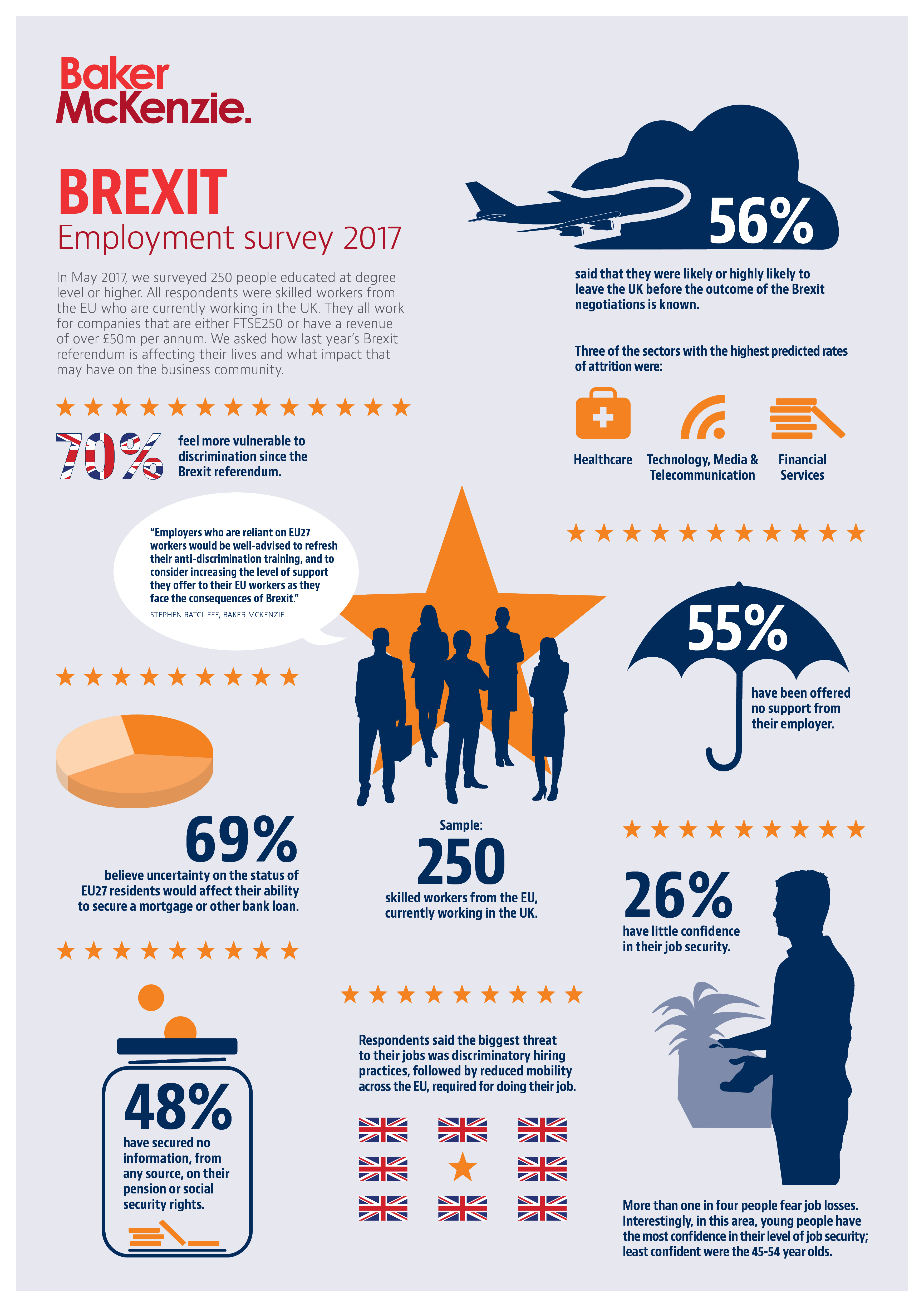More than half of EU-27 skilled workers employed by companies either in the FTSE 250 or with a revenue of over £50 million are likely to leave the UK before the outcome of the Brexit negotiations is known and before the UK leaves the EU in March 2019. This is according to a survey of 250 EU-27 nationals educated at degree level or higher, by global law firm Baker McKenzie.
More than half (56 per cent) of skilled workers surveyed stated that they were ‘highly likely’ or ‘quite likely’ to leave the UK before the outcome of the Brexit negotiations is known, with healthcare (84 per cent), technology media and telecoms (64 per cent) and financial services (43 per cent) sectors likely to be the most hard-hit.
The findings indicate the potential size of the skills gap which will result from the UK’s departure from the EU and which spans across a number of sectors, including Financial Services, TMT and Healthcare.
Baker McKenzie employment partner Stephen Ratcliffe says, ‘Last week’s election result and the current uncertainty around the immigration status of EU nationals, underlines the need for all employers – especially those reliant on EU workers – to address their employees’ concerns around Brexit as a priority.
‘Companies should also be taking steps now to develop talent and support and incentivise talented employees to stay within the business or they could face a significant skills shortage in the near future. This could be further compounded should there be delays to negotiations with the EU.’
Already, 42 per cent of those surveyed confirmed they had taken action to change their immigration status since the EU referendum in June 2016, with another 40 per cent confirming their intention to do the same.
Vulnerability to discrimination since the EU referendum
Less than three quarters (70 per cent) of those surveyed stated that they felt more vulnerable to discrimination since the EU referendum, with 38 per cent of those describing themselves as feeling ‘vulnerable’ or ‘very vulnerable’. In the healthcare and financial services sectors, perceptions of discrimination were highest at 94 per cent and 88 per cent respectively.
Moreover, more than one in four people surveyed fear job losses with respondents citing the biggest threat to their jobs as discriminatory hiring practices. Half (57 per cent) of respondents rated this threat at a four or a five out of five. Reduced mobility across the EU required for doing a job, was the second biggest concern rated a four or five out of five by 46 per cent of respondents.
Stephen Ratcliffe says, ‘These findings would suggest that the perception of discrimination is a key driver for skilled EU nationals seeking to leave the UK. Employers should be refreshing their anti-discrimination policies, particularly in the context of recruitment, and offering their staff support as they face the consequences of Brexit.
‘Outside the workplace, almost 70 per cent of respondents thought that uncertainty regarding the status of EU-27 residents would affect their ability to secure any future mortgage or loan.’
Lack of employer support
The survey also reveals that more than half (55 per cent) of EU-27 employees surveyed had not been offered any support by their employers in relation to Brexit. Of the remaining 45 per cent who had been supported, 94 per cent found that support helpful with the majority of those surveyed citing ‘information’ and ‘job security’ as the types of support that had been offered by their employers. This clearly indicates that there is strong appetite from employees for assistance.
Ratcliffe adds, ‘Employers who are reliant on EU workers should be taking active steps to engage with their employees on the subject of Brexit, and to offer them support and assistance to address areas of uncertainty for them and their families. Failure to do so, could result in a significant skills drain for businesses in the near term, regardless of the Brexit deal reached.’
Such employer support should also extend to information for EU-27 employees about their pension and social security rights. Almost half (48 per cent) of those surveyed said they had not obtained any information about the impact Brexit might have on their pension or social security rights. This was particularly the case for Financial Services with more than half (55 per cent) of employees saying they had not received any information.








